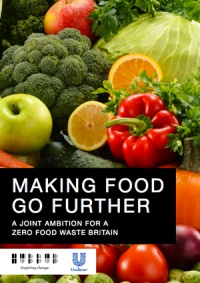Engaging campaigns and fresh messaging needed from collaborative food waste plan
 The fight against the UK’s 10 million tonnes of annual food waste is to get ‘fresh messaging’ and ‘engaging campaigns’ following the development of a ‘Joint Ambition for a Zero Food Waste Britain’.
The fight against the UK’s 10 million tonnes of annual food waste is to get ‘fresh messaging’ and ‘engaging campaigns’ following the development of a ‘Joint Ambition for a Zero Food Waste Britain’.
Resulting from a partnership between Unilever and sustainability campaign charity Hubbub, the ambitious project is hoping to bring together organisations from throughout the food supply chain to tackle the issue of food waste at consumer, business and policy level.
Together the project is aiming to develop a ‘dynamic and broad’ coalition of organisations to help households better understand the value of food and reduce waste in the UK.
The project, supported by the Waste & Resources Action Programme (WRAP), has been developed in response to research commissioned by the two organisations, which revealed that awareness campaigns are not doing enough to spread the message about food waste.

As all of this food waste occurs, there has been a sharp rise in the use of food banks in the UK, and the Hubbub and Unilever partnership, in the project’s launch report – ‘Making Food Go Further’, notes that ‘redistributing surplus edible food can help alleviate the pressures they face’.
After consulting 240 organisations and analysing polling of over 2,000 households, the ambition settled on five core principles for taking the fight forward:
- Collaboration between organisations from all sectors is essential to reducing household food waste;
- Communication should demonstrate the value of food ensuring as much as possible is eaten;
- Awareness needs to be built on the wider environmental, social and financial impact of food;
- Skills and knowledge need to be built so that people get maximum value from food; and
- Consistency is needed for food waste collection systems across the UK.
The possibility of a national communications campaign spoke to 57 per cent of those polled, while 67 per cent said that ways to reduce food waste should be put on the national curriculum. 84 per cent said that consistent recycling facilities throughout the country, something the government is currently working on, would help reduce food waste.
Commenting on the project, Charlotte Carroll, Sustainability Director at Unilever UK, said: “As a food manufacturer, we understand that more needs to be done to address avoidable food waste, especially as in the UK alone, one fifth of struggling families experience food poverty.
“That’s why, through our Joint Ambition, we are taking collective action to drive lasting transformational change in this area. With our exciting partnership with Hubbub, who are experts in food waste and behaviour change, we will be delivering a series of consumer campaigns.”
Summer food waste campaign kicks off project
To kick off the drive towards more engaging campaigns, Hubbub and Unilever this week launched a summer campaign that seeks to inform holiday-goers on how to make the most of their food and not let it go to waste while they’re away.
Supported by research that revealed that over £500 million-worth of perfectly edible food is thrown away in the UK when people head off holiday, the campaign encourages consumers to either freeze, gift or cook what’s in their fridge before they leave.

The summer campaign is the first of a number of practical campaigns that aims to put the Joint Ambition into practice and Hubbub and Unilever hope that a growing number of organisations will join together to back the Joint Ambition.
Importance of collaboration
Trewin Restorick, CEO of Hubbub, said: “The Joint Ambition has been created following extensive consultation with organisations working across the food chain. This demonstrated a huge desire to act on food waste and the importance of collaboration. The Joint Ambition will provide a practical and positive way of turning this desire into action and we are delighted to be working with Unilever to make this happen.”
David Moon, Head of Food Sustainability at WRAP, said: The Joint Ambition highlights the need for a coordinated focus on food waste prevention, communication, skills and the recycling of unavoidable food waste. In this, it is really focused in helping households value their food and drink.
“Significantly, the Joint Ambition is also well aligned and contributes to the food waste targets and delivery programmes within our industry-wide Courtauld 2025 agreement. We therefore look forward to the Joint Ambition being achieved.”
Read the full ‘Making Food Go Further’ report on the Hubbub website. 









